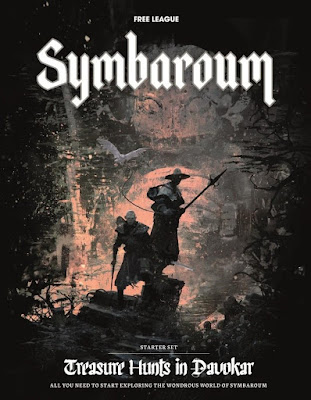Though a toolbox for allowing you to tell fantasy stories of all kinds, Dragonbane is a game with room for laughs at the table and even a pinch of silliness at times – while at the same time offering brutal challenges for the adventurers. We call this playstyle mirth and mayhem roleplaying – great for long campaigns but also perfect for a one-shot if you just want to have some quick fun at your table for the night.
Dragonbane is quite an interesting RPG for a number of reasons and I hope to get around to discussing it at some point, but there are several other games and gaming products ahead of it in my review queue. However, the "mirth and mayhem" tagline really caught my attention, in part because it reminds of a phrase my friends and I have used for years – high adventure and low comedy.
I can't quite recall precisely when we coined this phrase, but we did so as a way to capture what the experience of playing most RPGs was actually like at the table – not what its designers wanted to be like, which is quite a different thing. This is an important distinction. With a handful of exceptions, like Paranoia or Toon, whose stated intention is to be humorous, most roleplaying games are written and meant to be played seriously. "Serious" doesn't mean utter devoid of humor, of course, but the humor is accidental, a natural consequence of the unpredictability of playing any game, especially one where player choice and dice rolls contend with one another.
What my friends and I call "high adventure and low comedy" is thus very often (though not exclusively) the result of exactly this: dice with a mind of their own. One of my most popular posts touches on this very topic, though from a slightly different angle. However, the point remains the same, namely, that it's well nigh impossible to avoid moments of unexpected levity when so many of a character's actions are determined by the roll of dice. There's simply no way to ensure that even a high-level and competent character will always succeed at the right moment. Instead of making his save against dragon breath, he might fail and be burnt to a crisp. The reverse is also possible and the all-powerful Dark Lord might, metaphorically speaking, slip on a banana peel as he attempts to menace the heroes who've dared to confront him in his lair.
Over the years, I've experienced many examples of this. In my House of Worms Empire of the Petal Throne campaign, the character Aíthfo hiZnáyu has fallen prey to bad dice rolls on several notable occasions. And while I used those unintended mishaps as an opportunity to introduce new elements to the campaign, there's no denying that they were also funny – so much so that the players continue to chuckle about them years later. House of Worms has never been a deliberately funny campaign. Tékumel, with its detailed history, ancient mysteries, and constructed languages is perhaps the very definition of serious business when it comes to RPGs and yet there's no way to prevent unexpected silliness from creeping in from time to time – nor would we want to do so!
Dice rolls that go awry aren't the only source of humor. Players are every bit as unpredictable as dice. Sometimes, a player might just be in a whimsical mood and decide that his character does something goofy. Other times, he might be bored and want to shake things up by choosing to act in a way that's, in his opinion, more entertaining. Or maybe someone misspeaks, calling a character by the wrong name or accidentally – or, worse, intentionally – making a pun that causes everyone to erupt into laughter. There are simply so many ways that a roleplaying game session can descend into unintentional humor that there's no point in worrying about it. Instead, it's best to embrace it these moments of levity and enjoy them for what they are.
I think that's why, when I came across the passage I quoted above, I was so taken by it. Over the years, I've read a lot of roleplaying games. Very few of them acknowledge that low comedy is very often the inescapable companion of high adventure. You can't really have one without the other, not without clamping down so hard on anything that deviates in even the slightest way from the Truth Path that, in the process, you've also sucked all the fun out of roleplaying. These are games, after all and they're meant to be fun. They're also exercises in human creativity and interaction, both of which often take us to unexpected places.
Isn't that why we play these games in the first place?





